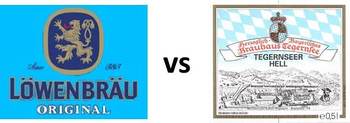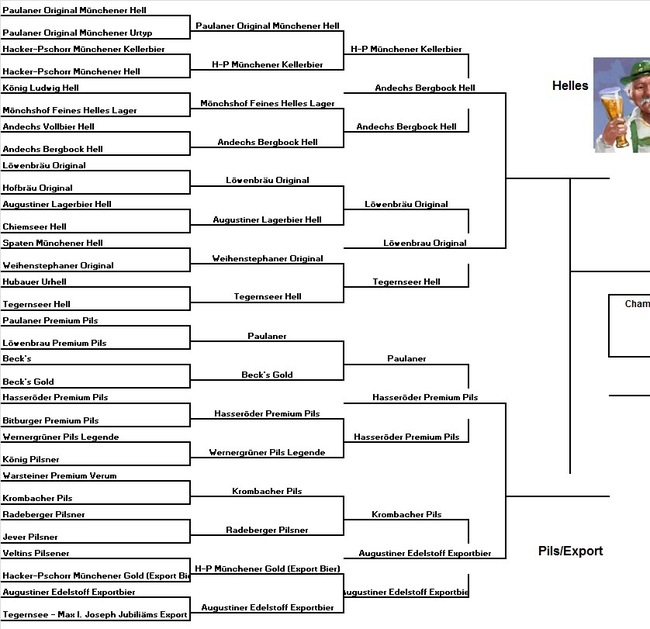We started this round on a cold night, with all the happy beers lined up outside waiting for the games. The best thing about winter - outside of skiing - is that your balcony is magically transformed into a giant drink refrigerator for at least 5 months per year. We took fuuuuull advantage of this during the beer tournament.
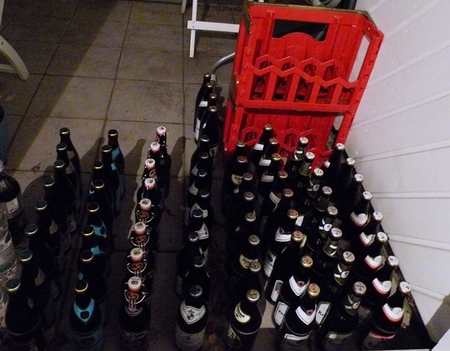
We decided to follow wine tasting procedure and move from lighter to stronger, so we began with two classic Bavarian helles, Löwenbräu Original and Tegernseer Hell. You'll recall from the first round matches that Löwenbräu shocked us by winning a blind tasting against Munich favorite Augustiner. (Theories abound as to why: the difference between keg and bottle? The Augustiner beer gardens somehow bring additional magic to the maß? Who knows.) Tegernseer, however, predictably demolished the competition, though we did discover the surprisngly good cheap beer (39 cents per half liter!) Hubauer Urhell.
We had around 9 people voting most of the night. As expected, the Tegernseer was really much lighter and smoother than the Löwenbräu... but that ironically was it's downfall here. We prefered the more complex Löwenbräu to the silky smooth Tegernseer. Other were surprised to find that they preferred the Löwenbräu too -- again a prejudice shattered. The Tegernseer was crisp and refreshing, but perhaps a little too light for a winter evening. However, it did reinforce the experience of seeing people bringing cases of Tegernseer to the Isar river, leaving it in the water to cool, and grilling wursts. It's a great summer beer, but lost 6 to 3 with the temperature hovering around 0 degrees.
Next up were Hacker-Pschorr's Münchener Kellerbier (beer made the way they made it in 1490) and Andechs' wonderfully caramelly but light Bergbock Hell.
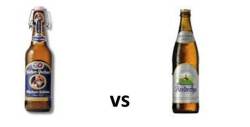 As in the prior round, the Andechs' Bergbock Hell trounced the competition (basically unanimous). At this point, it probably has the most votes and widest margin of victory of any beer in the tournament. It just has a great mix of sweet maltiness, a balance of hoppy bitterness, and the extra alcohol just works. Ironically, this surprised our Bavarian tasters too because they always knew they liked Andechs, but by default the regular Helles. Many think they now prefer the Bergbock Hell!
As in the prior round, the Andechs' Bergbock Hell trounced the competition (basically unanimous). At this point, it probably has the most votes and widest margin of victory of any beer in the tournament. It just has a great mix of sweet maltiness, a balance of hoppy bitterness, and the extra alcohol just works. Ironically, this surprised our Bavarian tasters too because they always knew they liked Andechs, but by default the regular Helles. Many think they now prefer the Bergbock Hell!
So those two matches leave use with a Helles Regional Final between Löwenbräu Original and Andechs Bergbock Hell.
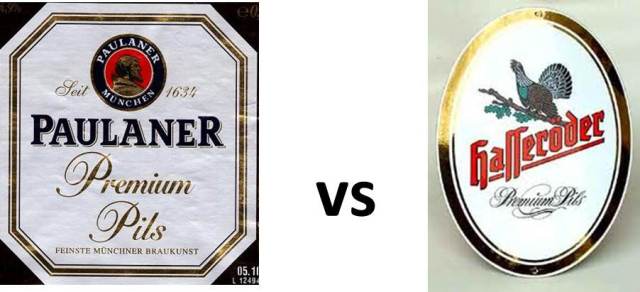 Moving down to the Pils/Export region, we start off with Paulaner Premium Pils vs Hasseröder Premium Pils. Neither prior round match was particularly close, with Paulaner plowing through the Beck's and Hasseröder clearly beating down the bitter beers with its malty take on the pilsner tradition. We had been really surprised by the Paulaner Pils, enjoying its flavor that was like a Pils for Bavarian palates. (You could argue that it is halfway to being a Munich Helles because it is a little sweeter and less hoppy, but it does use "noble" hops like a pils should.)
Moving down to the Pils/Export region, we start off with Paulaner Premium Pils vs Hasseröder Premium Pils. Neither prior round match was particularly close, with Paulaner plowing through the Beck's and Hasseröder clearly beating down the bitter beers with its malty take on the pilsner tradition. We had been really surprised by the Paulaner Pils, enjoying its flavor that was like a Pils for Bavarian palates. (You could argue that it is halfway to being a Munich Helles because it is a little sweeter and less hoppy, but it does use "noble" hops like a pils should.)
When the Paulaner Pils then went against the Hasseröder, a similar thing happened as with Tegernseer. Despite the advantage of being like a smooth helles, the Paulaner goes home while Hasseröder was voted through to the next round. The tasters thought Hasseröder had a better overall blend with that extra hoppiness; in this case, the crowd wanted a little more bite to the beer. The voting was pretty close though (5 to 4). On this evening, we're seeing some tasters consistently wanting a more "forward" beer that is on equal footing with any food on the table, and other tasters consistently looking for the biergarden/refreshing/ahhhh type beer. This evening, the testers wanting complexity had the majority.
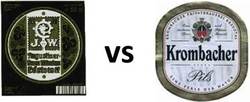 And finally, we had Krombacher Pils vs Augustiner Edelstoff Exportbier. Krombacher was fresh off a victory in the Power Pils Round, while Augustiner beat out Veltins and the other two Munich exportbiers to move on to this matchup. Krombacher is a prototypical pils: light golden color, crisp taste with noticable hoppiness. The Augustiner Exportbier is more like a helles but with significantly more hoppiness than their regular Helles. Think of it as coming to a similar place as the Paulaner Pils (sweeter/less hoppy than a pils, more hoppy than a helles) but from the other direction. That was the difference: the hops balanced with a more malty complexion gave the game to Augustiner Exportbier. It was a solid victory, with 2/3 choosing the Augustiner.
And finally, we had Krombacher Pils vs Augustiner Edelstoff Exportbier. Krombacher was fresh off a victory in the Power Pils Round, while Augustiner beat out Veltins and the other two Munich exportbiers to move on to this matchup. Krombacher is a prototypical pils: light golden color, crisp taste with noticable hoppiness. The Augustiner Exportbier is more like a helles but with significantly more hoppiness than their regular Helles. Think of it as coming to a similar place as the Paulaner Pils (sweeter/less hoppy than a pils, more hoppy than a helles) but from the other direction. That was the difference: the hops balanced with a more malty complexion gave the game to Augustiner Exportbier. It was a solid victory, with 2/3 choosing the Augustiner.
This night leaves us with happy memories (and headaches the next morning), as well as two regional final matchups:
Helles Region - Andechs Bergbock Hell vs Löwenbräu Original
Pils/Export Region - Hasseröder Premium Pils vs Augustiner Edelstoff Export
